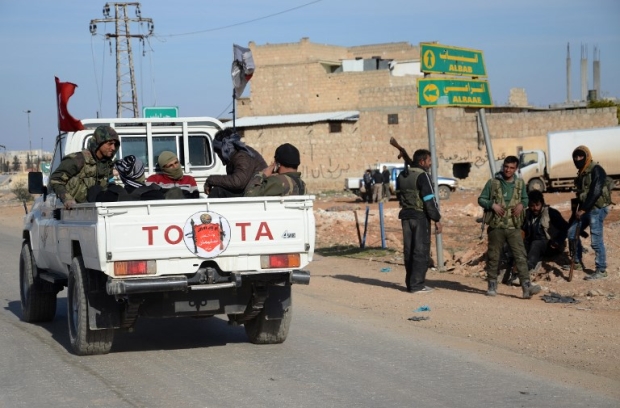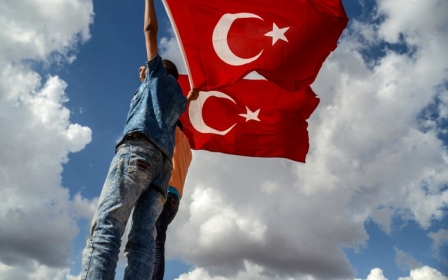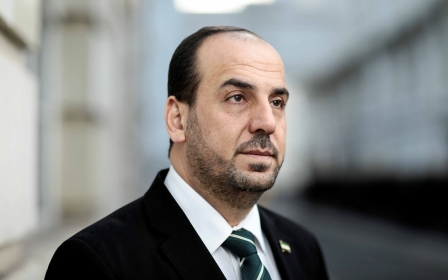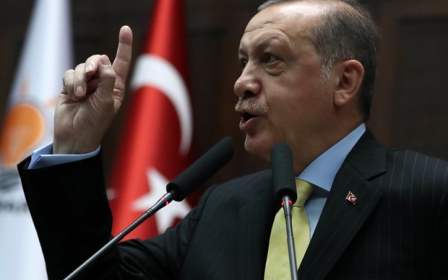Al-Bab's patience with Turkey wears thin after rebel lawlessness

Like any other day at work, Dr Mamdouh Matlab arrived at the Al-Salam Hospital in the northern Syrian city of Al-Bab to make his rounds of the wards.
Arriving a few minutes early, Matlab sat down on a bench close to an empty office and rifled through his bag for patient notes.
After three years of living under Islamic State group (IS) control - a period of public beheadings and strict controls on daily life - Matlab and the other residents of the city were beginning to adjust to a life free from the militant group.
Danger still resides in Al-Bab, however.
The doctor was on his way to see his first patient when he heard raised voices and shouting down the hallway.
Running to see what was happening, he saw a nurse kneeling on the floor, crying, as a member of the Turkish-backed Al-Hamzat Brigade pointed a gun at her head.
"Someone from the Al-Hamzat faction was screaming and shouting at the nurses and doctors. One of their fighters needed urgent medical care, but no one was able to attend to him," said Matlab.
"They ended up dragging one of the doctors out of the hospital like he did a crime. We were scared and didn't know what to do."
The Turkish-backed rebels also ransacked and harassed medical staff in the Al-Hikmah hospital elsewhere in the city on the same day, according to the UK-based Syrian Observatory for Human Rights.
One week on, the whereabouts of the kidnapped doctor, whose identity is withheld for security reasons, remains unknown.
An invitation to return
The battle for Al-Bab, a three-month offensive on the IS-held city that was conducted as part of Turkey's Operation Euphrates Shield to better protect its border with Syria, left considerable damage.
Once IS was ousted, Turkey urged displaced Syrians - including the many who had fled north across the Turkish border - to return and help rebuild the city. Matlab heeded this call and came back.
Turkish-occupied areas in northern Syria have become a haven for displaced Syrians.
Following pro-Syrian government forces' successes in rebel strongholds around Damascus and northern Homs province, hundreds of thousands of Syrians have sought refuge in the country's north, including areas controlled by Turkey and its allies.
The displaced and returned residents have swollen the city's population, with hundreds of Syrians recently evacuated from northern Homs stuck on the city's outskirts. Turkey is refusing them entry, insisting Al-Bab is full.
While residents say life in Al-Bab today is more stable than during the reign of IS, months of sporadic infighting among Turkish-backed rebel groups - which has led to the deaths and wounding of many civilians - has led many caught in the crossfire to question their choice to come back.
With hospitals and medical workers now swept up in lawlessness and violence, patience with Turkey's control of the city is beginning to wear thin.
Safety concerns
The doctor's kidnapping angered hundreds of residents, who protested outside the police station in Al-Bab earlier this month. The crowd called for the doctor's release and an end to the rebel clashes in their city.
Moments after the protest began, Turkish troops jumped out of their armoured vehicles and started shooting into the air to disperse the protest.
But rather than turning away, the protesters directed their anger towards the Turks, chanting "free, free, Al-Bab" and telling soldiers to "go back to where they came from", according to videos posted on social media.
Matlab joined the demonstrators. "Turkey is playing a significant role in the city, treating Al-Bab like it is its own soil. But they are not doing enough to improve security," he said.
"I have always been unsure about Turkey's role in the city, and despite the improvement of services, people are continuing to die from clashes by rebels who they support. Something needs to be done about this."
Badr Taleb, a videographer based in Al-Bab, was also at the demonstration, where he said a stray Turkish bullet grazed his forehead.
During IS's occupation of Al-Bab, Taleb lived in Aleppo city and retreated to its countryside when Syrian President Bashar al-Assad's forces tightened the noose around the opposition-held eastern neighbourhoods, which fell in the last days of 2016.
He now regrets coming back to Al-Bab following a recent bout of fighting between the Al-Hamzat fighters and rebels from Deir Ezzor.
"Things are just getting out of control. We appreciate Turkey and the role it's played, as other world powers turned a blind eye," said Taleb.
"But it must bring the rebels it supports in line, and not allow them to ruin everything Turkey has been building for the Syrians."
'Better than nothing'
Despite the simmering tensions between residents and Turkish troops in Al-Bab, Syrians have told MEE that for now, they have no choice but to work with the Turks.
Turkey has a significant presence inside Al-Bab, and since taking the city has helped repair damaged buildings, reopened schools and begun construction on a new industrial zone.
But according to Matlab, stability and safety inside Al-Bab remain its residents' key priorities.
"The situation is no different from how it used to be under the regime," said a dismayed Matlab.
"When a robbery took place, we would go to the police station and sign a report about what was stolen and expect nothing to be done.
"Now we can still go to the same police station. Only this time, the officers we have are trained and backed by the Turks. It's useless but better than nothing."
New MEE newsletter: Jerusalem Dispatch
Sign up to get the latest insights and analysis on Israel-Palestine, alongside Turkey Unpacked and other MEE newsletters
Middle East Eye delivers independent and unrivalled coverage and analysis of the Middle East, North Africa and beyond. To learn more about republishing this content and the associated fees, please fill out this form. More about MEE can be found here.





